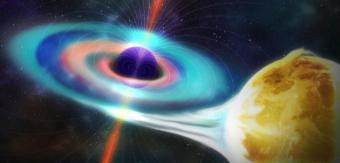Overview
Signature Seminars are a chance to interact with some of UF's top Faculty.
Learn from top faculty about their research area and interests. You are able to register for these courses without applying.
The Extreme Cosmos
The Universe can challenge your understanding of nature in strange ways!

The Universe hosts a broad range of physical environments and phenomena. In the most extreme conditions, events and behaviors there can challenge our current understanding of the laws of Nature. In this 1-credit discussion-based Honors course, we will take an overview of some of the most extreme physical environments in the cosmos - some of which are in our own astrophysical "back yard". We will cover phenomena ranging from supernovae and gamma-ray bursts, to merging black holes, to Dark Matter and Dark Energy. Assignments will consist of weekly readings before class, with in-class activities focused on discussing the phenomena and their implications for our understanding of the Universe. While the course will be largely non-mathematical in its approach, some previous exposure to physics and mathematics at the college level will be required to facilitate the discussions. PHY2048 or PHY2060 is a prerequisite.
Professor Stephen Eikenberry
Dr. Eikenberry is currently a Professor of Astronomy and of Physics at the University of Florida. He completed his Ph.D. in Astronomy at Harvard University in 1997 under Dr. Giovanni Fazio, and from there moved to the Sherman Fairchild Postdoctoral Prize Fellowship in Physics at Caltech. He moved next to an Assistant Professorship (1998) and then tenured Associate Professorship (2002) in Astronomy at Cornell University, where he won an NSF CAREER award in 2000. In 2003, he left Cornell to become a Professor of Astronomy at the University of Florida.
Materials for Mitigating Climate Change*
Climate change from rising CO2 levels in the atmosphere is one of the greatest challenges humanity faces. A key question going forward is how do we reshape the world to address this problem and create a carbon-neutral world. Materials discoveries have shaped our lives throughout our history and the discovery of new materials has solved many problems we have faced. The purpose of this course is to explore how new innovative materials can help address climate change. We will discuss the sources of CO2, the feasibility of new materials to help create a carbon-neutral world and how the implementation of these new materials may alter our lifestyle. Topics to be covered include discussions on how materials might be used to mitigate CO2 associated with energy, housing, Industry, transportation, water etc. Finally, the use of materials to capture CO2 from the atmosphere will be discussed. The goal of the class is to explore the challenges associated with the CO2 rise and start to envision what is needed for a carbon-neutral world of the future.
As this class will be taught from a scientific point of view, a basic understanding of scientific principles at a high school level will be necessary. Grades will be determined primarily from participation in the discussion-based classes and a final project.
*This course explores a social cause. Looking for others? Cross-reference Fall 2020 offerings here.
Regenerative Medicine: Bench to Market 2 credit option
IDH3931 Regenerative Medicine: Bench to Market 1 credit option
1 CREDIT OPTION: Regenerative medicine creates an opportunity to lessen pathological processes, repair injured or congenitally defective tissues and organs for patients with conditions that are currently incompletely or not addressed. The UF Center for Regenerative Medicine explores several complementary approaches, including rejuvenation, replacement, rescue, and repair, to improve patient health. Each week a different faculty member from the Center for Regenerative Medicine, or visiting lecturer with specific expertise in the field, will give a lecture on topics critical to regulation and implementation of regenerative medicine. Students enrolled in the 2-credit class will also be required to review appropriate literature prior to each lecture and actively participate in an interactive discussion during class. Students will gain a better understanding of the processes involved in transitioning from basic science and pre-clinical study findings to clinical therapy trials. Bringing regenerative therapies into clinical trials, and ultimately into clinical practice, requires significant public-private partnerships and a thorough understanding of the regulatory framework. Therefore, a particular focus will be placed on academic-industry partnerships and navigating the regulatory environment of the Food and Drug Administration.
This one-credit course has no exams, and grades will be assessed based on attendance and participation in online discussions. Prerequisite courses: BSC2010/L and BSC2011/L. Introduction to Regenerative Medicine is NOT a prerequisite for this course.
IDH3931 Regenerative Medicine: Bench to Market 2 credit option
2 CREDIT OPTION: In addition to the 1 credit option, the UF CRM is offering a similar course that is worth 2 credits. After attending the lectures described above, a select number of students who enroll in the 2-credit option will have a more in-depth discussion with the lecturer. In addition to attendance and online discussions, project(s) will also be used to assess grades.
This two-credit course has no exams, and grades will be assessed based on attendance, participation in online discussions, and project(s). Prerequisite courses: BSC2010/L and BSC2011/L. Introduction to Regenerative Medicine is NOT a prerequisite for this course.

.png)